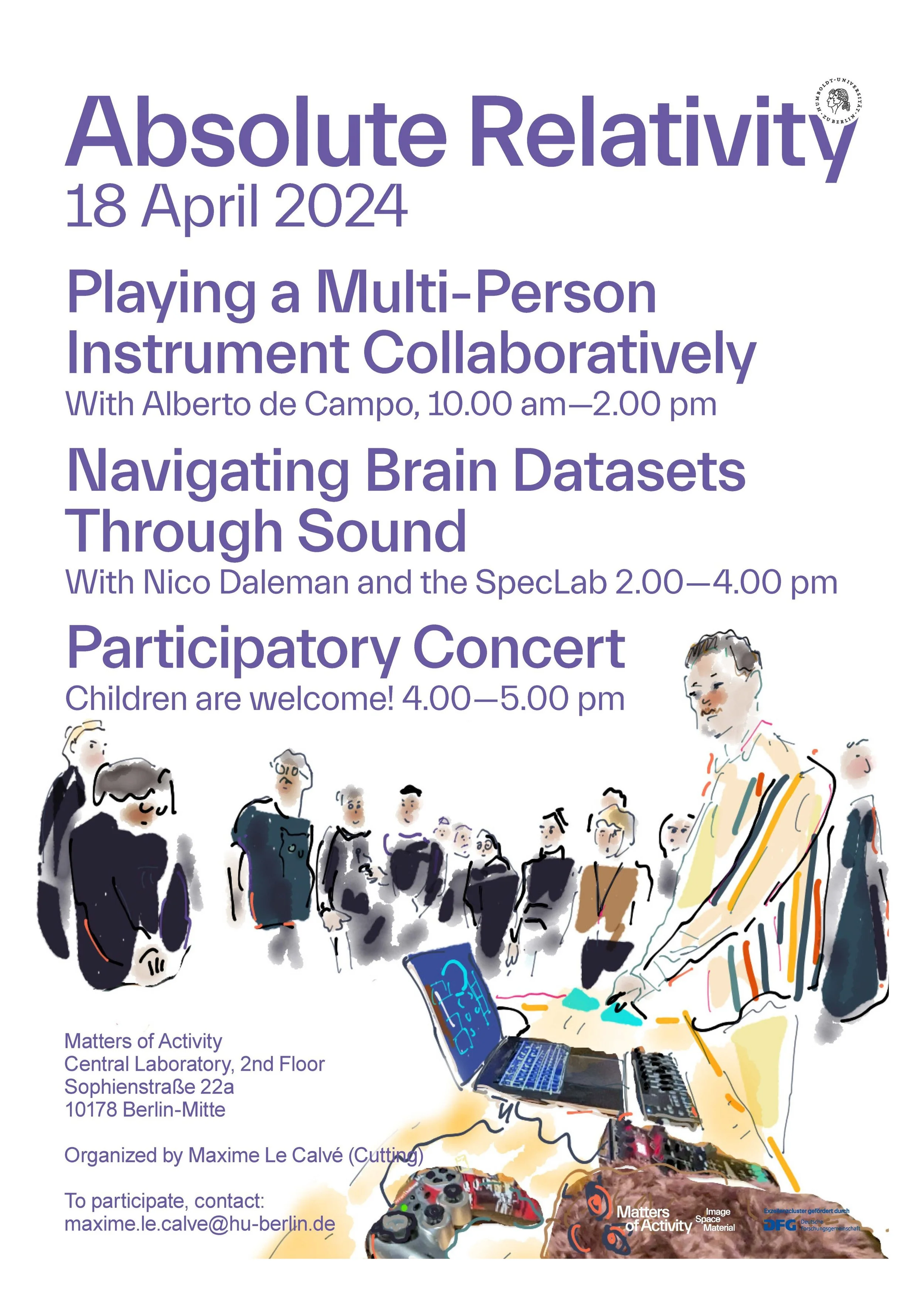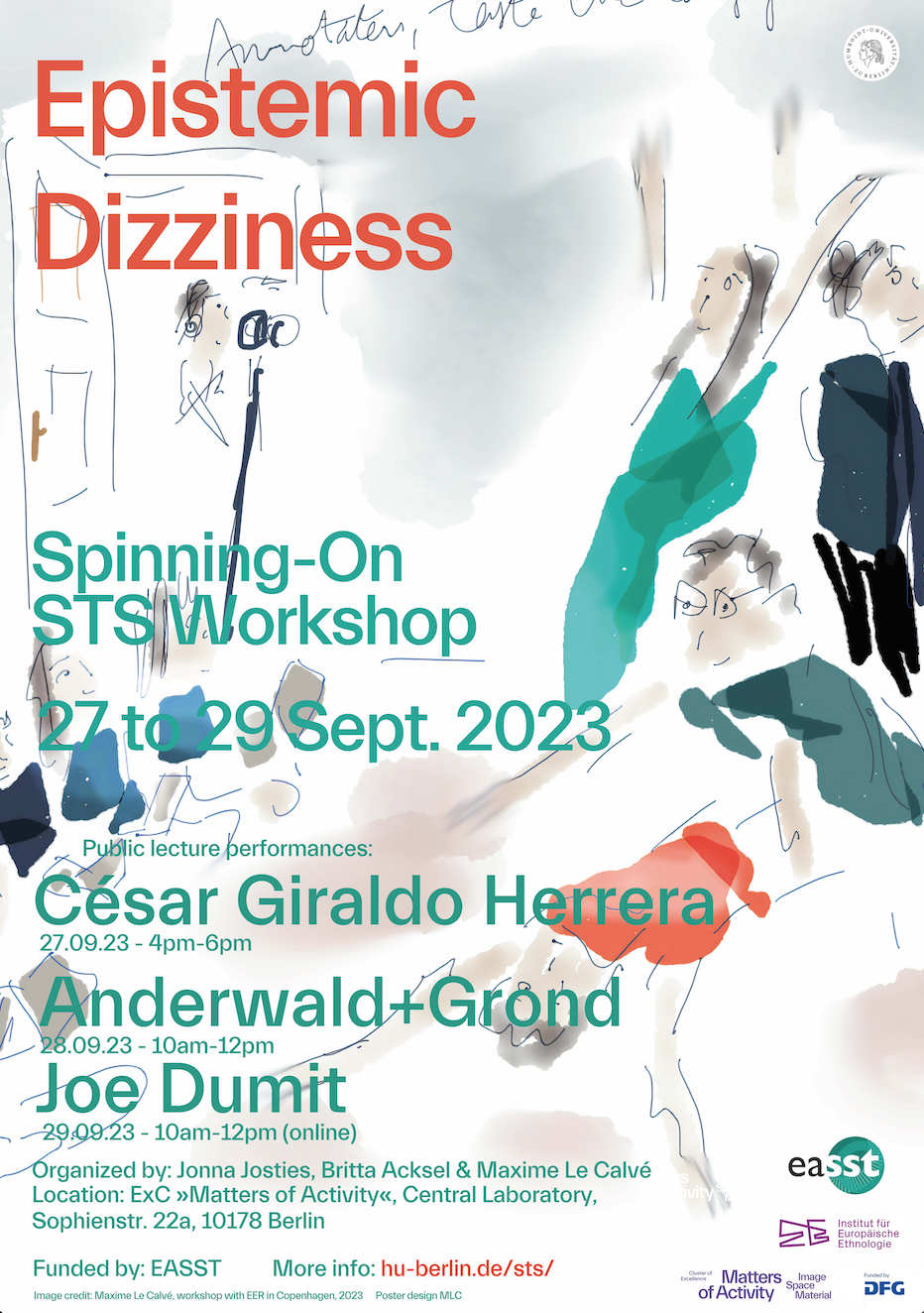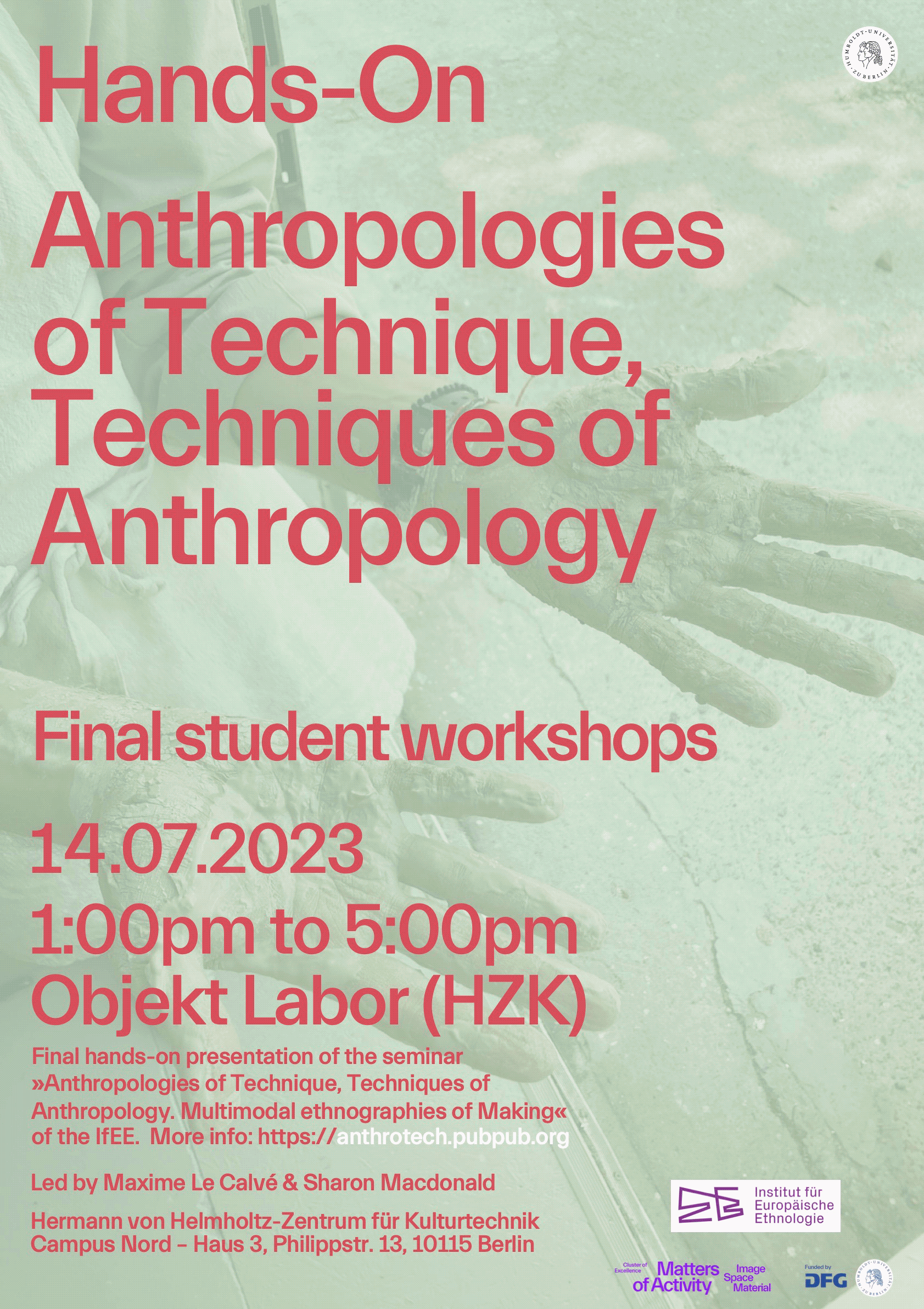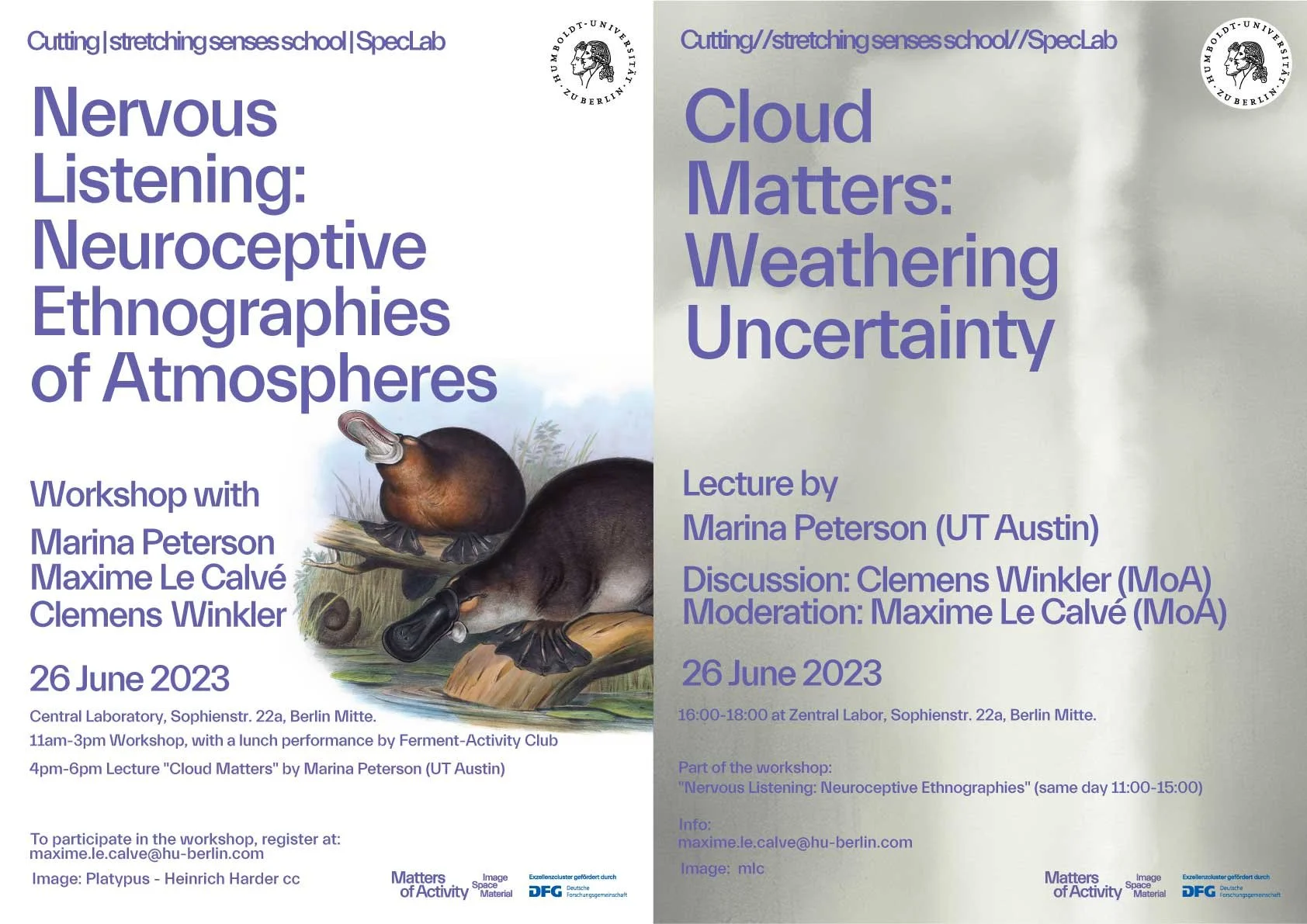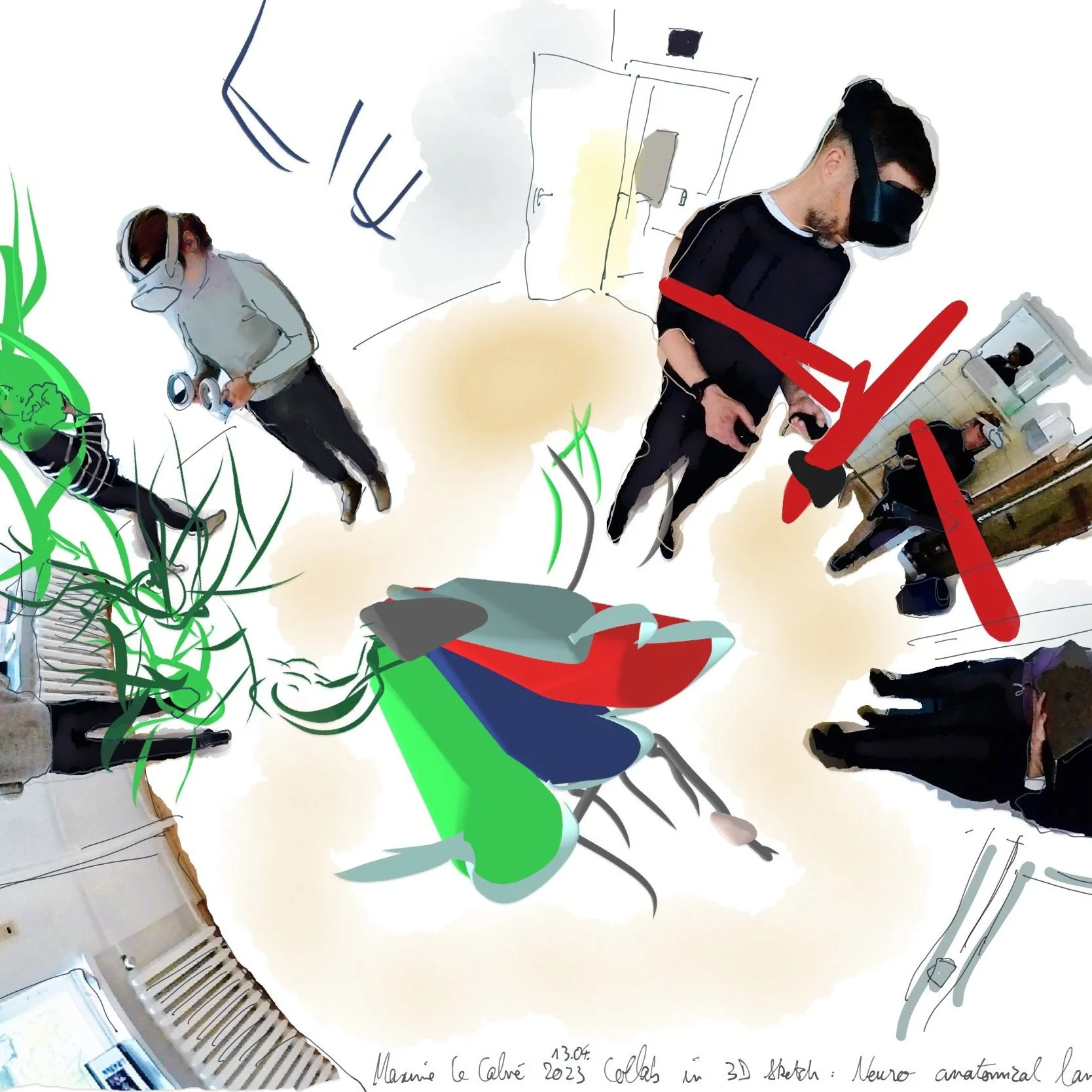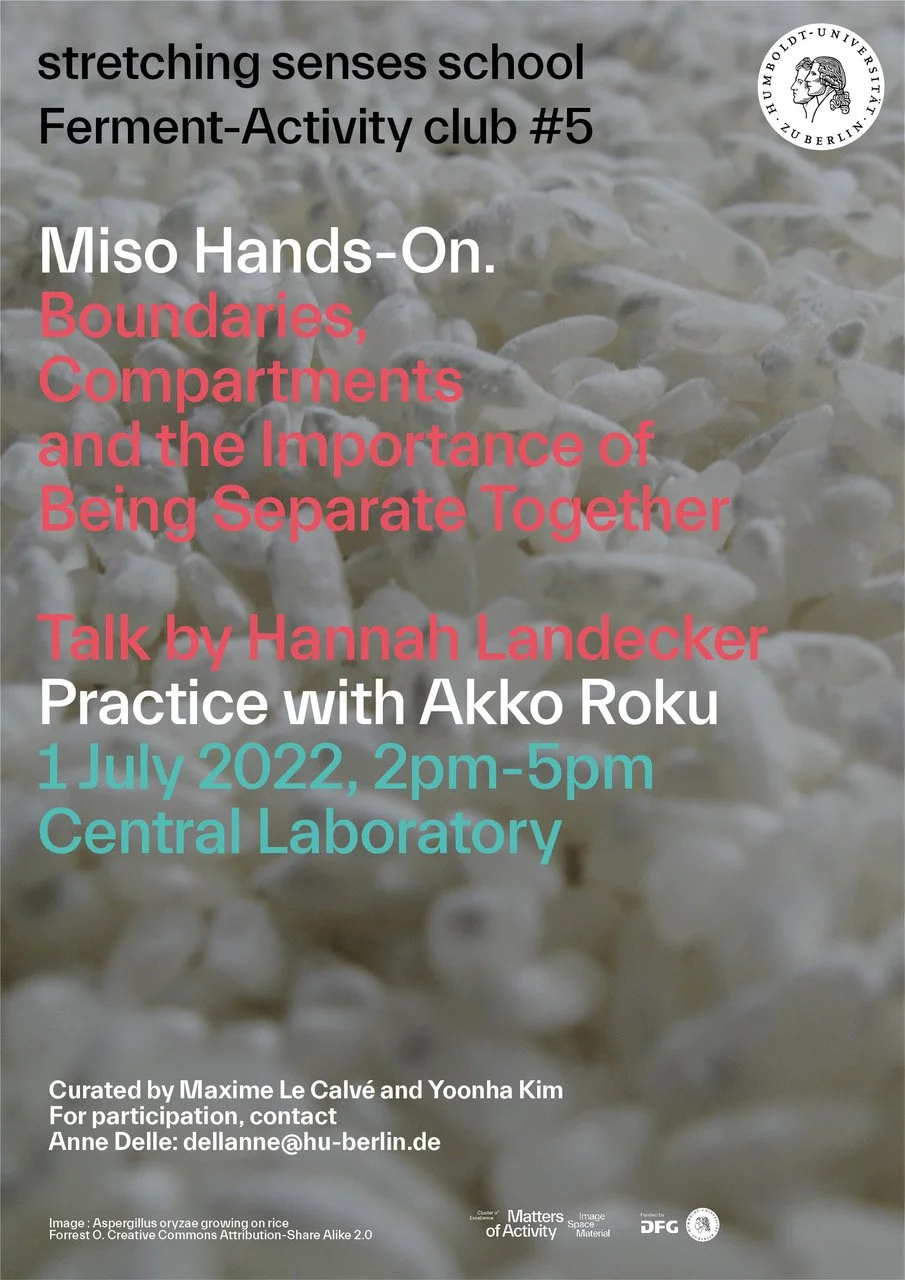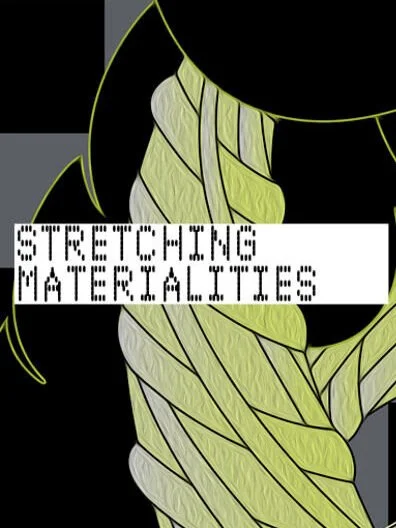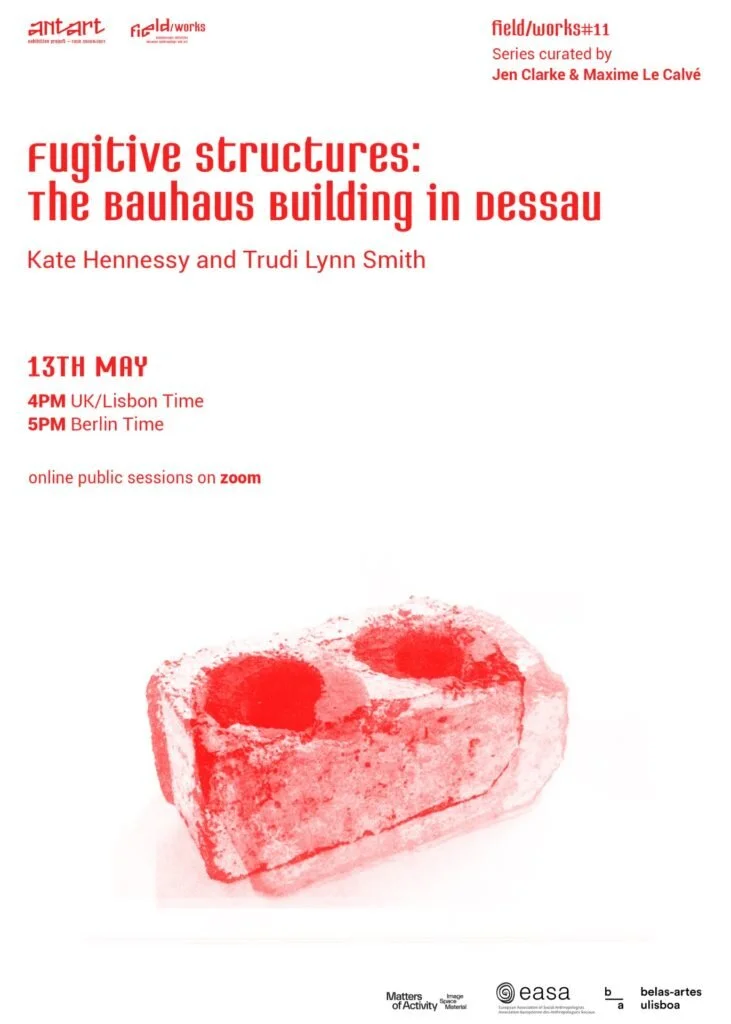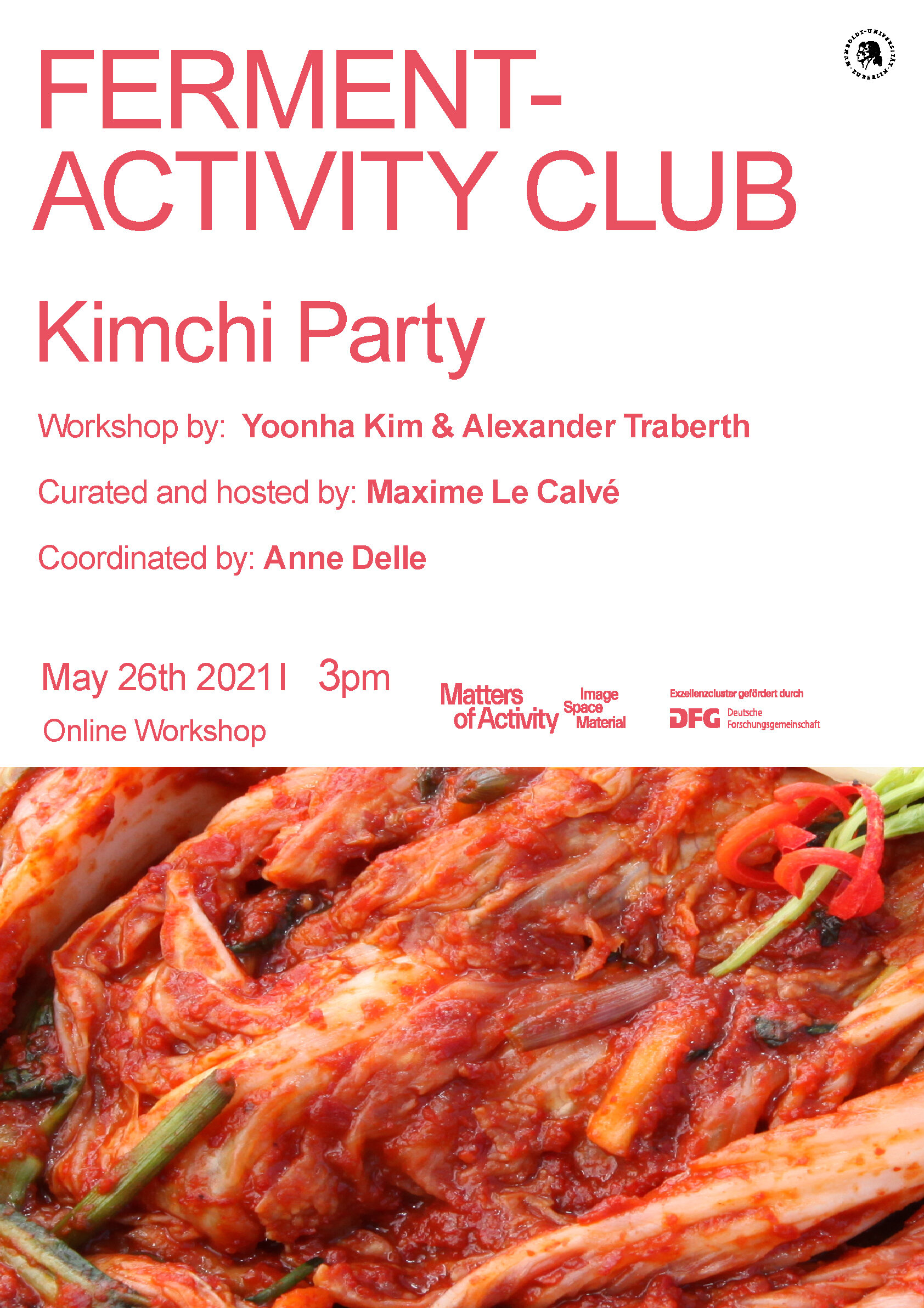Sketching Brains: a Participant Exhibition (2022-2024)
Based on the first series of fieldwork within the department at Charité by the graphic ethnographer Maxime Le Calvé and on the research of neurosurgeon and cultural scientist Anna Roethe about image guidance, this initiative takes the form of a series of two exhibitions. The first internal exhibition will curate side-by-side various notes and drawings representing and performing neurosurgical practice, by the ethnographer and by members of the clinic.
See more on the “Sketching Brains” project there.
Epistemic Dizziness, September 2023
In an era fraught with dizzying socio-political events and burgeoning ecological catastrophes, this editorial workshop for a special issue will delve into the concept of epistemic dizziness as a disordered state of whirling vertigo, applying it to the contemporary state of STS. As we navigate the tumultuous landscape of an open-ended pandemic, war, and socio-ecological devastation (Stengers 2021), the research practices of STS itself risk inducing ›epistemic dizziness‹. This workshop, inspired by Donna Haraway (2016), draws on ›serious fun‹ as a means of staving off paralysis and fainting, urging that knowledge production can serve as both a coping mechanism and a source of resilience. Repurposing the concept of ›ilinx‹, as delineated by Roger Caillois (1961), the series of lecture performances will critically examine playful dizzying practices in Western, indigenous, and other worlds as a pathway towards comprehending our vertiginously speedy world.
This workshop is funded by EASST.
We are looking forward and kindly invite you to save the date for this three-day workshop by Jonna Josties, Britta Acksel, and Maxime Le Calvé, which will take place at the Cluster's Central Laboratory, Sophienstraße 22a, September 27th-29th, 2023.
How to make sense of other ways of making? Seminar at HU Berlin, March- July 2023
Contemporary multimodal ethnographic approaches are deeply rooted in fieldwork interactions with other knowing and making communities. Describing and theorizing making practices contributes to triggering new interests in material cultures. It also branches out to further studies on embodiment and on the techniques of the self. Telling better stories of making means sharpening our techniques for storytelling, experimenting with new media, and probing other ways of entering into collaboration with epistemic partners.
During the summer semester of 2023, we engaged in four collective field works around technical activities: pottery, boomerang making, 3D sketching, and Iyengar yoga. We experimented with various ways to share the ethnographic experiences of “making” practices into text, drawings, workshops, and virtual installations. Students have also actively explored one technique of their choice during the course and documented their practice with a fieldwork notebook, using various techniques such as writing, sketching, 360° captures, etc.
On 14.07.2023, the students presented their “journals of technique,” and shared their newly acquired practices with the public.
Full open access documentation of the workshop on https://anthrotech.pubpub.org/
Nervous Listening: a Workshop on Neuroceptive Ethnographies of Atmosphere, June 2023
“Nervous Listening” is an experimental ethnography workshop led by anthropologists of art and science Marina Peterson & Maxime Le Calvé alongside designer Clemens Winkler. Together with the participants, we delved into the fascinating realm of "Neuroceptive Ethnographies of Atmospheres". Drawing inspiration from the platypus' unique capacity to perceive electromagnetic fields, we probed the potential of extending human perception to encompass other experiential worlds and uncover the relationships between inner and outer climate ecologies. Through a series of conversations and hands-on sensing scores involving balloons and environments, participants were invited to conceptualize and experiment with novel sensing and graphing methods to shift our attention to energies and materials. Workshop documentation here.
More-than-Ethnographic Probes: On Scales, Design Anthropology and Sensory Practices Beyond-the-Human
, April-May 2023.
Maxime Le Calvé traveled to Montréal for a short research and teaching stay at the Milieux Biolab and the Milieux Speculative Life Cluster at Concordia University. He was invited by Prof. Alice Jarry, an assistant professor of Design and Computation Arts (Concordia University, Montréal) who holds the Concordia University Research Chair in Critical Practices in Materials and Materiality.
Together, they conducted the workshop »More-Than-Ethnographic Probes.« This workshop is a fieldwork device and a platform for the development of collaborative sketching, writing, and documentation methods. They presented the results at the Uncommon Senses conference that same week. More here.
Speculative writing workshop: Stuart McLean, May 2023
Stuart McLean, professor of anthropology at the University of Minnesota, is invited by Maxime Le Calvé as part of the stretching senses school (Cutting/OSA) to give a writing workshop on multimodal anthropological fabulations. Suppose we accept that human lives and projects are inextricably intertwined with a host of other-than-human powers and presences (animal, vegetable, mineral, meteorological, etc.). How might we begin to engage these in ways that do not reduce them to human-centered systems of explanation? Perhaps this demands a creative as much as an analytical or descriptive approach.
Drawing and Learning Neuro-anatomical Landmarks Spatially, April 2023
How can we use 3D sketching to evolve neuroanatomical education, particularly to transmit the spatial understanding of anatomical landmarks and neurosurgical approaches? During this workshop, we initiated a group of students and researchers and set ourselves to explore other uses for one of the latest VR sketching software: Gravity Sketch. Together, we experimented and discussed the hands-on practice of thinking in space with lines and volumes in VR.
Organised and led by Paulina Greta Stefanović (HTW Berlin), and Cluster Member Maxime Le Calvé (anthropology) and Thomas Picht (digital neurosurgery) within the Speculative Realities Lab (Charité)
Workshop documentation: https://speculativerealitieslab.pubpub.org/pub/3dsketching
stretching senses school workshop: Scoring perspectives for speculative ethnography, November 2022
The two workshops with dance scholar Dorte Bjerre Jensen at the cluster “Matters of Activity" and in the Kunstgewerbe Museum helped us push forward our collective experiments in speculative ethnography and research-as-exhibition. We brought bodies and spaces into motion, and evaluated the potentials of interdisciplinary practices of “scoring” to explore, describe and analyze in first-person the activity of images, spaces, and materials based on the micro-phenomenological method (see Depraz, Varela, and Vermersch 2003, Bitbol & Petitmengin 2017), taking inspiration from the Sharing Perspective interactive performance developed by Dorte with Joe Dumit and the studio Olafur Eliasson. See more here.
stretching senses school: Workshop Series
at University of the Arts (UdK Berlin) w/ »Innovationen für die künstlerische Lehre«, 2022
The stretching senses school, an MoA project curated by anthropologists Yoonha Kim (Object Space Agency) and Maxime Le Calvé (Cutting), is starting a longer teaching collaboration with the UdK-based project InKüLe (Innovationen für die Künstlerische Lehre).
Epistemic dizziness.
Special Topic Panel at STS-hub, March 2023
What can a practice of epistemological vertigo teach us, as we are facing overflowing ideas, tools, and metaphors in humanities and especially in sciences studies? Are there techniques to grow ourselves out and through this state of off-balance? Maxime Le Calvé, Britta Acksel and Jonna Josties of the Laboratory for Human-Environment Relations (HU Berlin) introduced the notion of epistemic dizziness in a collective paper, followed by hands-on dizziness-inducing exercises. The contribution featured an AI-generated artwork created collaboratively by Lucius Fekonja and Maxime Le Calvé.
Full info here.
The Forests Within and the Brains Without: Panel at the European Association of Social Studies of Science, July 2022
Brains and forests are examples of sites where multiple formulations of our possible futures have flourished in recent centuries: many theoretical attempts, and rich poetical metaphors, bring together these living systems. Such metaphors have emerged since the beginning of modern science, casting converging technoscientific perspectives: neurons once appeared as trees to the naturalists, charting the way toward interventions, not only to heal but also to understand and naturalize psychological
knowledge. The foresters of the brains, the neurosurgeons of the forests, the microbiologists, and the fermentation enthusiasts exploring the evolutionary continuities of bacterias and human cells, all insist on navigating and thereby developing specific embodied knowledge about the relations that encompass and inhabit these milieux. In dialogue and in negotiation with the current credo of
technoscience, they are committed to an understanding of the more-than-human, or the beyond-human, which builds upon these relations.
Ferment-Activity club #5: Miso Hands-On, July 2022
This was an outstanding session with special guests Hannah Landecker and Akko Roku.
Hannah Landecker is professor of history of science in UCLA and she is currently writing a book on the industrialisation of metabolism. She previously published on microphotography, bacterias, indigo, picture animation in biology, and many other fascinating topics. Akko Roku is a food artist and a fermentation wizard. She will introduce us to the practice of Miso and to her homemade Koji culture.
Both presentations were entangled into a three hours hands-on workshop. We provided the supplies, and the miso is now in our custody for one year in the cluster’s cellar.
Stretching Senses School Festival, June 2022
Feeling limestone grow from the inside and seeing its dispersion as urban landscape; experiencing an amphitheater through vibrations of willow branches; reaching out to the hidden electrical energies of things around us; touch the surface of cellular tissues. The »Stretching Senses School Festival« exhibits site-specific virtual reality artworks from ongoing research at the Cluster at TA T, in the continuation of the »Stretching Materialities« exhibition.
How can we stretch our senses to explore the world at different scales? Around the thematic of planetary health, the festival brings together different projects that evolved out of a co-educative experiment between multimodal anthropology and immersive interaction art, curated by Maxime Le Calvé and Yoonha Kim, assisted by Anne Delle. The event on June 23rd-25th features four new VR installations and a fantastic lineup of digital performance lectures by leading environmental thinkers Tim Morton, Dominic Boyer, Lisa Messeri and John Tresch.
Final presentations of our curated responses to the Stretching Materialities exhibition, December 2021
We are very happy to invite you for the final presentations of the stretching senses school, an exhibition-as-research project embedded in our exhibition Stretching Materialities.
This final event will take place on Dec 16, 4-6pm online.
The stretching senses school is a curated response of the Berlin-based digital art community to the OSA exhibition, in collaboration with the Node Institute Berlin. The team of 8 selected participants, led by 4 mentors (Jemma Woolmore, Nayeli Vega, VanTa and Mickey von Olst) is delivering thought-provoking exhibits that will be integrated into the work on display at TA T until the beginning of March.
You will find an augmentable and commentable open-access documentation of the working process there.
The anthropological curatorial team:
Yoonha Kim, Maxime Le Calvé, assisted by Anne Delle
Application open until the 15.09.21!
The ongoing climate disaster puts many worlds in imminent danger. But conveying the entanglements of the more-than-human relations is an arduous task. Playful approaches can directly affect our sensory faculties beyond the realm of power and knowledge. The »stretching senses school« is an education-as-research project at the Tieranatomisches Theater Berlin (TA T) attached to the exhibition Stretching Materialities, co-partnered with the Node Institute Berlin. Through this workshop-based contribution to the exhibition, we intend to foster collaboration between anthropology and immersive interaction design. We will engage with research-creation in order to raise awareness of the public on the multiscale and embedded interconnections between humans and other earthly beings.
All information at this address: https://www.matters-of-activity.de/en/activities/6301/?preview
A project developed with the fantastic Yoonha Kim (MoA).
»Stretching Materialities«
(Sep 2021 - Apr 2022)
The Cluster of Excellence »Matters of Activity« invites you to a special kind of lab tour: In the Tieranatomisches Theater, the project »Object Space Agency« opens the virtual gates on June 29th, 3.45 pm to let you experience the hidden activities of materials:
Enter a tangible atmosphere, let the wind blow in your face, feel crackling rattan braids under your feet, immerse yourself in virtual reality perspectives, and travel with our glass elevator. And it doesn't stop there: wear haptically vibrating clothing that responds to its surroundings and experience weathering over millennia with selected stone samples. In »Stretching Materialities«, you can experience what no one else sees: The objects and structures around us are active and alive. And we interact with them whether we realize it or not.
Curated by Clemens Winckler, Natalija Miodragovič, Yoonha Kim, Nina Samuel, Yoonha Kim and Maxime Le Calvé
Trailer, dates, and information there.
Between Day & Night
: “Immersive Slideshow”, 2021
What if we were able to command a digitalized archive of fieldwork pictures to take off and start spiraling around? The virtual reality installation Between Day & Night: Immersive Slideshow combines the research-creation project Tamed Cloud of the EnsadLab/Spatial Média (Paris) with the research on image knowledge and digital materiality of Object Space Agency at the Cluster of Excellence »Matters of Activity.« The dual-mode existence of the slide reveals the twofold and iterative mode of knowing related to images and to their materiality: an incessant alternation between coding and dreaming, sorting and imagining, analyzing, and storytelling. Taking the Peter H. Feist collection of the IKB as a case study, this site-specific installation elicits a sensorial and evocating experience. It suggests how virtual reality can contribute to truly upgrade the tools of the discipline of visual anthropology, art history, and image theory, and how it can help to endow digital pictures with new kinds of active materiality.
Augmented Reality: code and materiality in art and culture, 03.09 - 30.09.21 at the Institute for Art History and Image Theory in Berlin. Link.
ANTART Field/Works Talks, 2021
In 2021, with Jen Clarke, we are curating and hosting a series of art and anthropology talks with the contributors to the second part of the exhibition, which should happen physically in September in Lisbon. This was the opportunity to generate a new set of conversations with guests around the ANTART network.
You can access our podcast here:
in Apple Podcast.
And soundcloud.
Field/Works, 2020-2021
For anthropologists and artists “doing fieldwork” in contemporary worlds, art can be much more than an object of investigation. Curation and creation through visual, audio, or performing arts are at the heart of their work, extending the established anthropological interest in writing as a medium of thought and knowledge sharing. This exhibition presents works by anthropologists and artists who break disciplinary boundaries, and whose practice foregrounds experimental, and open approaches to the theme “field/works”.
The Field/Works series is a part of the activities of the ANTART network of the European Association of Social Anthropologists and is a partnership with the Faculty of Fine Art of the University of Lisbon (FBAUL). The virtual exhibition in 2020 ran in parallel to the EASA conference, it was co-curated with Jen Clarke and Anna Laine.
TATour, 2020
During the COVID crisis, our team “Object Space Agency” was denied access to on-site research as we were preparing an exhibition aiming to show non-human activities in an ancient veterinary anatomical theatre taking on multispecies ethnography in exhibition spaces. Digital drawing and painting in 360° pictures revealed to hold the unanticipated potential to support our endeavor. The creation of a virtual tour provided us with new means of exploration of this space and of its otherworldly inhabitants, remotely inspired by the children's book “Night at the Museum" by the illustrator Milan Trenc (1993).
With this contribution, we intend to reflect critically on the dramaturgical multimedia skillsets and mindsets which were brought forth during this experimental fieldwork. I argue that these images work in a manner analog to that of the psychedelic drawings by Michael Taussig: “in pointing away from the real, they capture something invisible and auratic that makes the thing depicted worth depicting.” (2011, 13) Taking imaginative abilities more seriously could empower anthropologists, enabling them to take part in new kinds of speculative investigations on ontologically varied forms of alterities.
“Nocturnal Fieldwork at the Veterinary Anatomical Theater”, 2020
Artwork related to TATour on display at the virtual exhibition Multimedia Encounter (Multimodal Anthropology Lab at UCL).
Shelf Life & the Ferment-Activity Club, 2020-…
Fermentation is a complex set of techniques bridging food substances, microbes, and the environment, which makes us question the distinction between decay and flourishing. Inherently a filtering activity, fermentation relies on the long-standing relationship of yeast and bacteria to nutrients and the elements. Through practices of food transformation, preservation, and consumption, the newly woven symbiotic entities emerge from fermentation processes and enter into a different ecosystem – that of the human body, itself a multi-organism entity. These entities are directly in correspondence with our microbiome: fermented food has, in a way, already stepped into the human digestive system before it is ingested.
Drawing on anthropological and historical perspectives, we also aim to examine pockets of resistance against industrialization - communities still practicing ferment activity - while framing them in a broader picture of modern foodways, understanding this phenomenon as a »Gleichzeitigkeit des Ungleichzeitigen«. We seek to re-enchant the supposedly simple task of cooking with the concept of »nurturing materials«: a feminist ecological approach in which we recognize the two-way nurturing and caring processes that are sustained between bodies human and non-human, and within it, a new understanding of ourselves as part of symbiotic ecologies.
Undergoing series of online workshops.
Updated info on the MoA Blog.
Bertsulari:
a radiophonic experiment with ethnomusicology, 2014
How can we understand and question what happens when the anthropologist of music creates an experimental, material, and narrative device, at the same time a real music situation and a situation of production of ethnomusicological knowledge? And above all, how to make this device "work" as well as possible, so that interesting phenomena feel invited to it? Our ship-laboratory program "Bertsulari", was chartered thanks to the wonderful collaboration between the program Couleur du Monde and the Institut de Recherche sur les Musiques du Monde.
Ethnologists, ethnomusicologists, and Françoise Degeorges embarked with the musicians they love to make them meet in the intimacy of a sound skiff, a shared stage skillfully arranged in the belly of the Maison de Radio France.
A study day at EHESS followed: speakers were invited to question restitution, experimentation, and commitment in social sciences, addressing key questions such as the participation of a large public in scientific reflections, the construction of a radio-theatrical device and the active role of the researcher in the worlds he explores.
https://www.radiofrance.fr/francemusique/podcasts/ocora-couleurs-du-monde/lancement-du-paquebot-radiophonique-bertsulari-sur-les-ondes-de-france-musique-3490634








